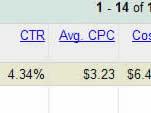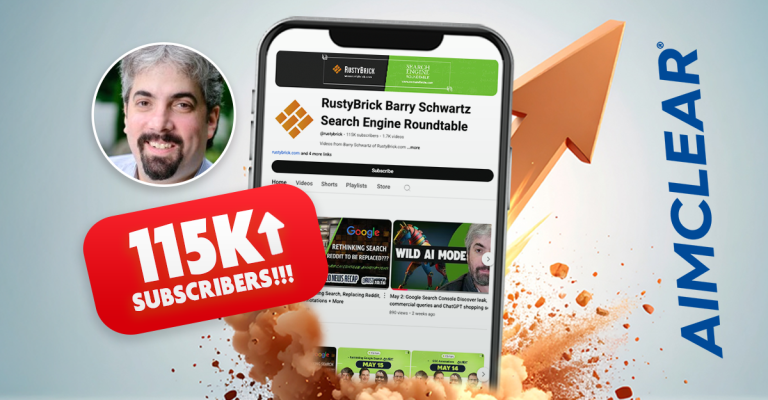 The first question most clients ask when considering pay per click for the first time is “how much should we budget.” That’s a fair question given the way business works. We budget, spend, test ROI, proceed, re-budget and refine, or abandon the tactic. That’s how things have always worked in the realm of media expenditures. First businesses budget and then they spend.
The first question most clients ask when considering pay per click for the first time is “how much should we budget.” That’s a fair question given the way business works. We budget, spend, test ROI, proceed, re-budget and refine, or abandon the tactic. That’s how things have always worked in the realm of media expenditures. First businesses budget and then they spend.
PPC Budgeting is a 2 Step Process
PPC is different in that costs are unpredictable without testing. First we spend and then we budget. It’s a 2 step process. After limted testing (while avoiding the PPC ramp up money pit) PPC costs can be quite predictable and ROI tracking tools (analytics) much more advanced. The trade-off is as follows: willingness to test in order to determine budget + modern analytics = financial predictability and absolute ROI testing.
The Old Advertising Agency Way
In the traditional advertising agency media buyer model (think broadcast television, radio, cable, newspaper, billboards, collateral print etc…) the selling-sales-representative offers the agency media buyer a “rate card” along with the flavor of the month deal. Usually the price is fixed and buyer has a budget. In this scenario it’s easy for the media buyer to plan for the next fiscal year and set aside the cash. The prices are known and fixed.
Predictable Cost = Little Absolute ROI Testing
This traditional model gives the advertiser comfort in knowing with some certainty what costs will be quarter by quarter and day to day. The only metric left to chance is ROI. Bummer…The irony is that, while costs can easily be ascertained ahead of time and planned for, there is usually no iron clad way to test sales conversion or the value of “traffic” a given advertisement generates towards sales of a product or service.
The results of success in conventional advertising channels might be that someone walks in the door of your shop, calls to inquire, or tells friend. These types of traffic responses, albeit valuable, can be hard to cross segment with causal connections like billboards, brochures, and signs at hockey arenas. Therefore the trade off for an ability to pre-budget is that ROI testing is questionable, dependent on coupons, word of mouth, a separate 800 number for the call to action, and other more anecdotal ROI measuring methods.
PPC Budgeting Takes Guts At First.
Pay per click (PPC), at first gape, is an entirely different animal. However if thought about appropriately PPC offers the best of all worlds: predictable budgeting and bullet proof conversion measuring. It just takes some guts at first, a pay per click management company that you trust, and understanding that testing is required prior to determining the absolute budget. I know you want to know how much…we have to test first.
How Much Does a House Cost?
Asking “how much PPC cost” is a little like asking “how much does a house cost?” You can’t tell until you walk through the rooms, contrast against comparable properties, and test the market with an offer. Likewise there are many variables and market factors involved in costing PPC including the competitiveness of the niche’ and geographic areas in which you wish your advertisements to display.
It is possible to focus text ad targeting to specific and highly focused demographic segments OR market by banner display, audio, and video ads to Internet “walk-by” traffic, which is still targeted but less focused. There are multiple search engines, verticals, local search channels, and specialty sites selling different types of eyeball space by different business models.
Trust and Modern Analytics
To determine the cost of any PPC campaign you must work with a PPC manager you trust. Good pay per click managers don’t think spending money on lots of traffic is sexy. They think spending money on highly focused traffic that converts a high percentage of traffic to sales at acceptable financial ratios is sexy.
Modern analytics like ClickTracks provide incredible transparency. If your PPC manager doesn’t use modern analytics to report absolute sales conversion past the standard click through ratio and cost per click the search engines provide, consider another management firm. AIMCLEAR‘s clients know that we’re not happy unless we can rule in or out the success of PPC campaigns based on actual sales cross segmented with each node of a PPC campaign. Using modern analytics we directly associate tactics (all the way to the keyword level) with revenue, period.
SO-HOW MUCH DOES IT COST!
Sorry, unlike traditional media buys we spend first and budget soon afterwards. Trust us-it will work out better in the end. For a little testing, the greater budget can be determined and set. We usually ask clients to commit a small budget to testing PPC “theories” that we might have. We state PPC “theories” in a goal oriented manner where we set out to prove the ROI. Once proven, we’re usually able to scale the campaign.
A 2 Step Process
In the world of business budgeting comes first, than expenditures. PPC is different in that it’s a 2 step process. In PPC first we spend and then we budget. The trick is attaining a comfort level in pre-budgeting for the test with an understanding the overall planning will follow. Once any theory is proven by test, usually after hundreds or few-thousands of dollars, than we can move forward full throttle with confidence in the result.
The rewards for making PPC budgeting a 2 step process are deep and valuable. Imagine ad placements as fully measurable. If modern analytics and trustworthy managers are involved than PPC can be a solution with stability, conversion tracking, and predictability you’ve only dreamed about.
Resources:
9 Cost-Effective PPC Branding Strategies | Marketing Pilgrim
Beating down the cost of PPC advertising | Neil Patel
PPC Cost Audit — Give Your Search Marketing Campaigns A Checkup | The Rimm-Kaufman Group
Measuring Pay-Per-Click Performance | Search Marketing Standard
5 Steps to Pay Per Click Advertising That Works | CopyBlogger








